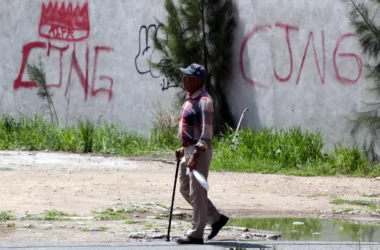In a dramatic display of discontent, hundreds of European farmers converged on Brussels, pelting the European Parliament with eggs and stones, demanding urgent attention from leaders grappling with the region’s deepening agricultural crisis. The protest, stemming from weeks of unrest and tractor blockades across European countries, aimed to spotlight the farmers’ plight amid challenges such as taxes, escalating costs, and stringent environmental regulations.
The protest, which unfolded during a European leaders’ summit, saw farmers from various countries, including France, Germany, and Italy, expressing their frustration. Reports indicate that small groups attempted to breach barriers outside the European Parliament, leading to clashes with police who responded with teargas and water cannons. Statues were damaged, and main roads in Brussels were blocked by a convoy of approximately 1,300 tractors, creating a tense atmosphere around the European Council headquarters where leaders were meeting.
The farmers’ grievances are multifaceted, encompassing issues such as inadequate compensation for produce, tax burdens, and challenges posed by environmental regulations. The overarching sentiment is that farmers are grappling with unfair competition from abroad, and the protest sought to amplify their calls for immediate assistance and policy reforms.
While the crisis within the farming sector wasn’t initially on the EU summit’s agenda, the sheer magnitude of the protests prompted an EU diplomat to suggest that discussions on the farmers’ situation could be initiated later in the day. President Emmanuel Macron of France, feeling the pressure, scheduled a one-on-one meeting with European Commission chief Ursula von der Leyen to address concerns about the future of European agriculture.
Despite several attempts by the European Commission to quell the unrest, including temporary exemptions and import limits, farmers remain dissatisfied. The EU’s moves include allowing farmland to be temporarily exempt from fallow rules and restricting imports of certain Ukrainian agricultural products. However, these measures have not sufficed to calm the widespread demonstrations and road blockades.
Facing sustained protests, French Prime Minister Gabriel Attal announced an additional €150 million in aid for farmers, emphasizing that further details would follow. The aid is intended to address the financial distress faced by farmers, who have been critical of major retailers and expressed anger over cheap imported food.
In addition to financial aid, French leaders are pushing for clearer legislation at both national and EU levels. The focus includes a ban on cheap imports that utilize prohibited pesticides and clear labeling of imported produce. Furthermore, France is seeking a precise definition of lab-grown meat at the European level, a move driven by concerns that such products don’t align with traditional dietary practices.
Amid the protests, there are indications of a ‘pause’ in France’s national plan to reduce pesticide use, emphasizing the need to reevaluate certain aspects for simplification. Additionally, all major supermarkets will undergo audits to ensure compliance with laws aimed at securing fair prices for farmers’ produce.
The protests by European farmers underscore a broader crisis within the agricultural sector, compelling leaders to address the urgent challenges faced by those responsible for feeding the continent. As tensions continue to escalate, the farmers’ fervent calls for financial support, policy reforms, and protection against unfair market practices serve as a poignant reminder of the critical role agriculture plays in shaping the economic and social landscape of Europe. The resilience of these farmers, symbolized by tractors blocking city entrances and eggs thrown at the heart of European governance, demands comprehensive and immediate attention to safeguard the future of European agriculture.








